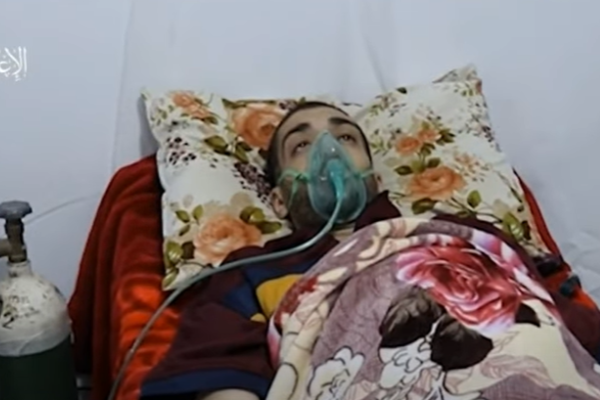Hisham al-Sayed, who was freed after spending nearly a decade in Hamas captivity, ‘doesn’t know how to speak, he doesn’t have a voice, he doesn’t remember anything,’ his father said.
By JNS
The father of Hisham al-Sayed, an Israeli Muslim Bedouin who was freed on Saturday after spending nearly decade in Hamas captivity in the Gaza Strip, urged the Arab world on Monday to take a clear stance against the terrorist organization.
Al-Sayed, 37, is being treated at Ichilov hospital in Tel Aviv after returning on Saturday and is reportedly in poor mental condition. According to his family, he suffers from schizophrenia and entered the Gaza Strip in 2015 in a moment of mental distress.
His father, Sha’ban al-Sayed, spoke to the press from the hospital.
“We want the Arab world, and particularly Arab society in Israel, to voice their opinion: What does it think about the fact that people in their workplaces, and women in traditional Bedouin clothing, were kidnapped and murdered?”
Bedouin, Arabs and others were among the 1,200 people murdered during Hamas’s Oct. 7, 2023 massacre, “and the Arab world did not speak out,” he continued.
With regard to his son’s return, he said, “We were glad that we could embrace him, but when I held him in my arms I saw that I’m holding something that is not human. It looks human, but is not human.”
Hisham “doesn’t know how to speak, he doesn’t have a voice, he doesn’t remember anything,” he said. “It just gives the feeling that he wasn’t kept in the company of human beings, and we are angry about it and we want an answer—why is this happening with the hostages?”
Hamas had conducted “petty politics on the back of a mentally disabled person,” he added.
During his son’s captivity, “We appealed to sheiks, mukhtars and clans in Gaza, but they sent us away,” he said. “Hamas didn’t allow these people to act. It’s true that [my son] is seen walking on his feet, but his condition is very difficult.”
Also freed on Saturday was Ethiopian Jewish Israeli Avera Mengistu, who had been held captive since entering the Palestinian enclave in 2014.
“Our beloved Avra has returned home to us. I cannot put into words what the heart feels,”Mengistu’s brother, Ilan, told journalists at the press conference on Monday at Ichilov hospital. “In these moments, our hearts are filled with deep gratitude to the Creator—we have been given new life,” he added.
Avera’s return “marks the beginning of healing for our family, the beginning of restoring trust between the community and the nation,” he said. “Your return alive after a decade is a moment of hope and joy, a ray of light and comfort amid the pain and suffering we have all endured since Oct. 7.”
His brother’s rehabilitation process would be long and difficult, but his family will be there to support him on his path “to return to life,” he said.
He took the opportunity to call on Israel to redouble efforts to secure the return of the remaining hostages.
“We must not let this situation continue. I beg you—do not let the beautiful pictures of those returning from captivity fool you. Behind the smile and the joy lay irreversible mental and physical scars,” he said.
The families of freed hostages Omer Shem Tov, Omer Wenkert, Eliya Cohen and Tal Shoham, who endured 500 days in captivity, shared some of those scars on Monday.
Speaking to the press at the Rabin Medical Center, Shem Tov’s mother Shelly said that Omer had been kept alone in a dark tunnel for 450 days.
While in captivity, he dreamed of laying his head on his mother’s lap and going riding with his father on his motorcycle, she related.
Wenkert’s mother Niva said her son never received any medical treatment for his colitis, a chronic condition of his.
“Omer defeated captivity,” she noted, adding that “our fight continues until the last hostage is home.”
Terrorists in Gaza are still holding 63 hostages, 36 of whom are believed to be deceased. Israeli Prime Minister Benjamin Netanyahu reiterated on Sunday the government’s commitment to return all the hostages.
